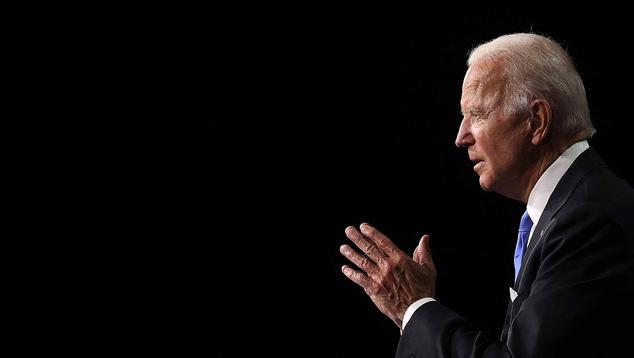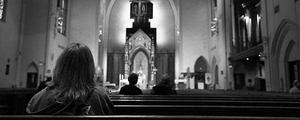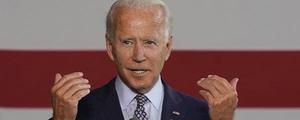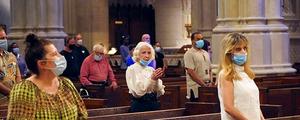It looks to me as if religion is going to be a bigger part of the presidential election process this year than it has been historically. This, to some extent, reflects a renewed emphasis on religion by Democrats and Joe Biden's campaign, particularly as evidenced during the recent Democratic National Convention. Here are seven interesting aspects of the interplay of religion and politics as both presidential conventions have come to a close.
1. Democrats put a significant emphasis on Biden's faith. A number of headlines coming out of the Democratic convention highlighted the emphasis that Democrats put on the importance of Biden's Catholic faith. Journalists noted that "Joe Biden's acceptance speech caps off an unusually faith-filled Democratic National Convention," declared the religious left as a winner of the convention, and highlighted that one of the key takeaways from the final night of the convention was "an emphasis on faith." Democratic speakers made many references to Biden's faith over the four nights of the convention. An ecumenical interfaith service kicked off the events on Sunday, and Delaware Sen. Chris Coons, himself a Yale Divinity School graduate and an ordained Presbyterian elder, led a religiously oriented lead-in to Biden's Thursday night acceptance speech.
2. The Democratic emphasis on religion was primarily focused on Biden the candidate, not on the direct relationship between religion and specific issue positions. This is, we can assume, partially because Biden has a track record of public discussion of his Catholic faith and the part it played in helping him deal with the tragedies he has faced in his life. Biden's campaign strategists may also have taken note of the fact that his opponent, Donald Trump, does not have a history that shows strong evidence of personal religiosity. Additionally, Pew Research earlier this year demonstrated that Americans are more likely to perceive Biden as religious than they are to perceive Trump as religious, providing Biden an existing attitudinal base for this ad hominem religious positioning.
This contrasts with the Trump campaign's strategy, which is largely silent on Trump's personal religiosity -- instead emphasizing religiously oriented policies, issue positions and executive actions Trump has taken.
3. The focus on Biden's faith takes place in an environment in which Democrats are significantly less religious than Republicans, leading to interesting strategic implications. This is clearly not an all-or-none situation; there are plenty of religious and nonreligious people in both party groups. But an analysis of data from Gallup's May "Values and Beliefs" surveys over the past three years shows that 46% of Republicans report attending religious services weekly or almost every week, compared with 32% of Democrats. More than one in five Democrats are "Nones" -- the group that has no official religious identity -- compared with just 9% of Republicans. And 60% of Republicans say that religion is very important in their daily lives, compared with 46% of Democrats.
Thus, Democrats face the challenge of a relatively smaller base of those who are both Democratic in political identity and likely by virtue of their personal religiosity to care about religion and the election. But Democratic strategists apparently feel that reaching out to religious Democrats with a faith emphasis is better than leaving the playing field entirely to Trump and the Republicans.
4. A focus on Biden's personal faith may not be as effective as one that focuses more on how a president's faith can affect policy actions. I base this conclusion on an important Pew Research study earlier this year that showed relatively few Americans think it is very important that a president share their religious faith or that a president has strong religious beliefs, even if different from their own. Thus, Democrats may succeed in convincing additional Americans that Biden is personally religious, but in and of itself that might not be a strong selling point to a significant majority of the voting population.
Plus, Biden faces a Trump campaign that is coming at Biden primarily based on the former vice president's policies and issue positions (not his personal faith). Trump has claimed that Biden is "against God" and will "hurt the Bible," apparently based on Biden's abortion positions. Similarly, Vice President Mike Pence in an interview this week focused primarily on Biden's positions on abortion and religious freedom relating to Obamacare, saying that "if you believe in faith and family and life and liberty, there's only one choice in this election and that's four more years of President Trump." Trump supporter and former Arkansas Gov. Mike Huckabee highlighted Biden's positions on abortion, religious freedom, traditional marriage and Israel when he said that Biden was not an option for 2020 religious voters. Cissie Graham Lynch, granddaughter of the late evangelist Billy Graham, said in her GOP convention speech that "the Biden-Harris vision for America leaves no room for people of faith. Whether you're a baker, a florist or a football coach, they will force the choice between obedient to God or to Caesar, because the radical left's god is government power."
5. Democrats were very ecumenical in their use of religion in their convention. In addition to the wide spectrum of religious speakers at the interfaith service, Democrats enlisted a highly varied list of religious leaders to provide invocations and benedictions before each of the four nights of their convention. These included an Episcopal bishop, a pastor who founded the National Latino Evangelical Coalition, a leader of the Greek Orthodox church, a Baptist pastor, a Catholic priest, a rabbi, and the leader of the Mosque of Islamic Brotherhood in New York.
The initial invocation at the Republican convention was delivered by Catholic Cardinal Timothy Dolan of New York, but two primary religiously oriented speakers at the convention were the son (Franklin Graham) and the granddaughter (Cissie Graham Lynch) of the late Protestant evangelist Billy Graham. On Saturday, Trump addressed "Evangelical Christians" by name in one of his series of religiously oriented tweets.
These emphases fit with the data to some degree. Republicans are significantly more likely to identify with a Christian faith than are Democrats (86% vs. 69%), and 7% of Democrats identify with a non-Christian religion, compared with 3% of Republicans.
6. All of this has created dueling use of religion by the two campaigns. As noted, Trump made a number of references to the religious implications of Biden's policies just prior to and during the Democratic convention. Even before it was over, Franklin Graham was talking about the "absence of God" at the Democratic convention, and numerous speakers at the Republican convention made the case that Biden and Democratic policies would be harmful to American religion. The Biden campaign has been less direct in its criticisms of Trump and his religious policies, in part because of the sensitivity of Biden's positioning among active Catholic voters due to the abortion issue. But Biden has clearly decided that, unlike previous Democratic candidates, religion this year is a valid consideration to elevate into the election discussion.
7. Will religious positioning make a difference? Both campaigns are using religion as a mechanism for increasing turnout among voters already predisposed to vote for their candidate. Creating a connection between an individual's religion and a decision to vote for a candidate can be particularly powerful, given that religion is related to strong underlying convictions and emotions that can lead to determined action. Republican presidential candidates have for decades made this connection to evangelical voters, to one degree or another, and the party now sits in a position where activating turnout among this group is a cornerstone of Trump's reelection efforts.
As I reviewed recently, the Democratic emphasis on faith would potentially affect four groups that have both a connection to religion and some preexisting Biden predilection: less religious Protestants, lapsed Catholics, Hispanic Catholics and Black Protestants. The first two of these groups skew toward Trump but include a solid number of potential Biden supporters. Both Hispanic Catholics and Black Protestants skew toward Biden, the latter in overwhelming numbers, so the effort to increase their turnout could have a significant impact.
Biden walks a tightrope of sorts, given potential pushback from highly religious voters who oppose his positions on abortion. Additionally, "Nones" form one of the largest religious identity groups among Democrats. It is not clear that an emphasis on Biden's personal faith would alienate Nones, but clearly the campaign needs to develop ways to show Nones that Biden's faith translates into their preferred policies, given an assumption that they are less likely to be swayed by evidence of Biden's personal religiosity.




